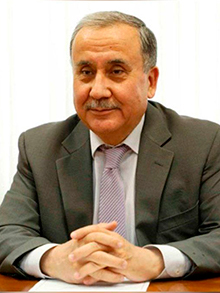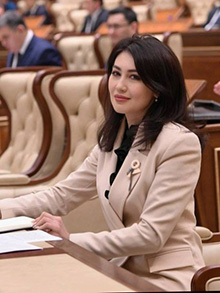
Strengthening Uzbekistan's international political and economic positions in the context of chairing the Turkic States Organization  Alisher Kadirov, Head of the Department of the Institute of Strategic and Regional Studies of the Republic of Uzbekistan
Alisher Kadirov, Head of the Department of the Institute of Strategic and Regional Studies of the Republic of Uzbekistan
In November of this year, Uzbekistan's chairmanship in the Turkic States Organization (OTS) concluded. It was marked by significant achievements that played a substantial role in strengthening the country's international political and economic positions. Throughout its chairmanship, Uzbekistan actively promoted initiatives aimed at enhancing Turkic cooperation, developing trade and economic ties, and expanding mutually beneficial relations with member countries of the organization.
READ MORE
- EGF Editor |
Published on EGF: 28.12.2023
| External Relations
-
Armenia and Azerbaijan Conclude the Year With Hopeful Prospects for Peace  By Vasif HUSEYNOV, PhD, Head of Department, AIR Center, Adjunct Lecturer, ADA and Khazar Universities, Baku
By Vasif HUSEYNOV, PhD, Head of Department, AIR Center, Adjunct Lecturer, ADA and Khazar Universities, Baku
On December 13, Armenia and Azerbaijan exchanged prisoners that each side had detained at different times since the end of the Second Karabakh War in November 2020. This historic exchange was made possible thanks to a significant breakthrough between the two countries on December 7. Baku and Yerevan issued a joint statement announcing a list of confidence-building measures to normalize relations and reach a peace agreement. Azerbaijan agreed to release 32 Armenian servicemen as part of the agreement, and Armenia reciprocated by releasing two Azerbaijani soldiers. While a number of unresolved issues remain, the recent success in bilateral consultations has given new hope for a comprehensive peace agreement between the two sides.
READ MORE
- EGF Editor |
Published on EGF: 20.12.2023
-
Why It Is Important to Diversify Armenia’s Foreign Policy  By Benyamin POGHOSYAN, PhD, Chairman, Center for Political and Economic Strategic Studies
By Benyamin POGHOSYAN, PhD, Chairman, Center for Political and Economic Strategic Studies
In recent years, perhaps the most discussed topic by international scholars, experts and politicians is the gradual transformation of the post-Cold War unipolar world order. There are different opinions about the process of transformation, the timing, and the main elements of this newly emerging world order. However, almost everyone agrees on one issue: the unipolar world is gradually becoming history, and before the final formation of the new world order, the next decade will be characterized by instability, conflicts, and economic shocks. Climate change and the ever-increasing role of digital technologies, including artificial intelligence, are additional factors of instability that make it even more difficult to assess, predict and formulate policies based on geopolitical developments in the coming years.
READ MORE
- EGF Editor |
Published on EGF: 20.12.2023
| External Relations
-
Does the EU Have any Strategy in the South Caucasus?  By Yeghia TASHJIAN, Beirut-based regional analyst and researcher, columnist, "The Armenian Weekly”
By Yeghia TASHJIAN, Beirut-based regional analyst and researcher, columnist, "The Armenian Weekly”
From November 27-29, 2023, a delegation of the European External Action Service (EEAS) and the European Commission visited Yerevan. The EU Delegation to Armenia said the purpose of the trip was to “explore possibilities to deepen and strengthen EU-Armenia relations.” Ideas were exchanged on “how to best leverage investments to address the immediate needs and enable integration of displaced Karabakh Armenians.” They agreed to “explore areas to strengthen cooperation between the EU’s Border and Coast Guard Agency (Frontex) and Armenia” and continue dialogue on matters of security and defence, such as the EU’s promise to explore non-lethal support to the Armenian military via the European Peace Facility. The EU representatives announced their support for the “normalization of relations between Armenia and Azerbaijan based on the principles of mutual recognition of territorial integrity and inviolability of borders based on the 1991 Almaty Declaration.
READ MORE
- EGF Editor |
Published on EGF: 20.12.2023
| External Relations
-
Gender equality in the civil service of Uzbekistan  Farangiz Avazbekova, Chief inspector of the Agency for the Development of Public Service under the President of the Republic of Uzbekistan; Doctor of Philosophy (PhD) in Law
Farangiz Avazbekova, Chief inspector of the Agency for the Development of Public Service under the President of the Republic of Uzbekistan; Doctor of Philosophy (PhD) in Law
The social and political activity of women and their participation in public administration bodies in the process of making important decisions are crucial for the development of the country. Sociological research has shown that women’s high efficiency, rapid and persistent decision-making, responsiveness to job completion, and prompt provision of executive discipline allow them to perform their duties effectively in the civil service.
READ MORE
- EGF Editor |
Published on EGF: 18.12.2023
| Security
-
Armenia between Russia and the West  By Benyamin POGHOSYAN, PhD, Chairman, Center for Political and Economic Strategic Studies
By Benyamin POGHOSYAN, PhD, Chairman, Center for Political and Economic Strategic Studies
The war in Ukraine has significantly impacted the geopolitics of the former Soviet space. As Russia – West relations have hit the lowest point since the end of the Cold War, or perhaps even since the Caribbean nuclear crisis of 1962, the newly independent states face tough choices in their foreign policy. Can they find a balance between Russia and the West, and if not, should they choose Russia or the West? It seemed that this conundrum should not apply to Armenia. The country is a member of all Russian-led organizations in the post-Soviet space – Collective Security Treaty Organization, Eurasian Economic Union, and Armenia hosts a Russian military base and Russian border troops. Thus, many may argue that Armenia has already chosen to be with Russia, and the war in Ukraine would complicate Armenian efforts to develop relations with the West, which Yerevan has done quite successfully in the last three decades.
READ MORE
- EGF Editor |
Published on EGF: 05.12.2023
| External Relations
-
Strained Relations Between Azerbaijan and the West  By Vasif HUSEYNOV, PhD, Head of Department, AIR Center, Adjunct Lecturer, ADA and Khazar Universities, Baku
By Vasif HUSEYNOV, PhD, Head of Department, AIR Center, Adjunct Lecturer, ADA and Khazar Universities, Baku
On November 16, Baku cancelled a meeting between the foreign ministers of Armenia and Azerbaijan scheduled to take place on November 20 in Washington. The Azerbaijani Foreign Ministry asserted that, under the current circumstances, it is not possible to proceed with US-mediated peace negotiations. The statement alluded to US Assistant Secretary of State James O’Brien’s comments during “The Future of Nagorno-Karabakh” hearing of the House Foreign Affairs Committee, Subcommittee on Europe on November 15. The hearing highlighted a growing break between Baku and Washington on how to proceed with the peace talks. Azerbaijan has called for “more regional solutions to regional problems,” while the United States and European Union hope to maintain influence over negotiations between Baku and Yerevan.
READ MORE
- EGF Editor |
Published on EGF: 05.12.2023
| External Relations
-
Strategic Abstention: The ‘Axis of Resistance’ Deliberate Inaction in Gaza
 By Fuad SHAHBAZOV, Baku-based independent regional security and defence analyst
By Fuad SHAHBAZOV, Baku-based independent regional security and defence analyst
Amid the escalating Gaza war, a striking absence marks the regional conflict landscape: the non-involvement of the ‘Axis of Resistance,’ including Iran and its proxies. Nearly six weeks into the war, these forces have consistently communicated their decision to remain on the sidelines. This inaction comes into sharp focus against the backdrop of Iran’s strategy to leverage non-state actors like Hezbollah and Hamas in its proxy warfare. While Hezbollah’s leader, Hassan Nasrallah, clarified their stance in a much-anticipated speech a month into the conflict, the impact of this abstention is profound. Israel, grappling with internal divisions and security vulnerabilities heightened by Hamas’s attacks, finds itself in a precarious position not seen in decades.
READ MORE
- EGF Editor |
Published on EGF: 05.12.2023
| Security
-
Location, Location, Location! Or Maybe Not!  By Benyamin POGHOSYAN, PhD, Chairman, Center for Political and Economic Strategic Studies
By Benyamin POGHOSYAN, PhD, Chairman, Center for Political and Economic Strategic Studies
It may appear that the primary obstacle to the signature of a peace treaty between Armenia and Azerbaijan is the different views of the sides on where to resume and finalize the process. Armenia wants to do that in Western platforms, while Azerbaijan wants to return to the Russian platform, use the 3+2 format, or have direct negotiations without any mediators. In reality, the roots of the current situation are more profound than simple geopolitical choices of venue.”
The military takeover of the self–proclaimed Nagorno Karabakh Republic by Azerbaijan has raised hopes that it may facilitate the signature of the peace agreement between Armenia and Azerbaijan. The logic behind this thinking was clear – the future of Nagorno Karabakh, and the fate of the Armenians living were the primary obstacles on the road toward peace. As all Armenians were forced to leave the region, and NKR de facto president Samvel Shahramanyan signed a decree about the dissolution of the republic by the end of 2023, it seemed that the stage was set for quick signature of the Armenia – Azerbaijan peace treaty, and then a push forward in the Armenia – Turkey normalization process.
READ MORE
- EGF Editor |
Published on EGF: 28.11.2023
| External Relations
-
